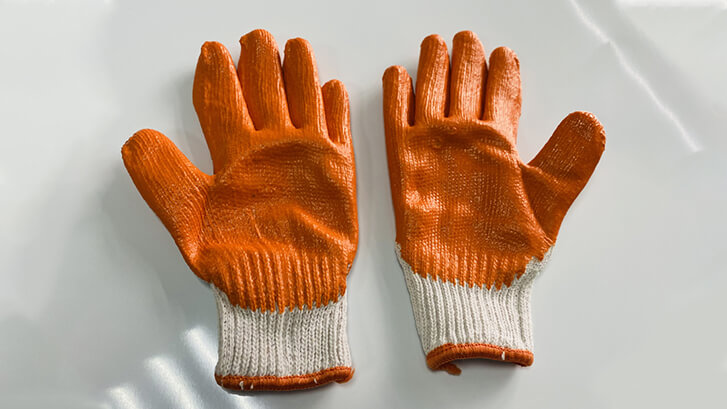Protecting your hands is a critical step, whether you are managing tasks at home or working in a demanding industrial setting. Your hands are constantly in motion, so keeping them safe from harm should always be a top concern. When thinking about hand protection, a key question often arises: When should you wear rubber-coated gloves? Let’s take a close look at this, ensuring your hands remain secure and comfortable.
Why Hand Protection is Paramount
Think about your day. Your hands perform countless actions, from delicate tasks to heavy lifting. They face various risks daily. Cuts, punctures, scrapes, and exposure to oils or chemicals are real threats. Therefore, selecting the appropriate glove for each specific task is crucial.
Types of Rubber-Coated Gloves and Their Properties
Latex Gloves
Made from natural rubber, these gloves offer excellent flexibility, comfort, and a good sense of touch. They provide reliable protection against punctures and many water-based chemicals. However, some people have latex allergies.
Nitrile Gloves
Crafted from synthetic rubber, nitrile gloves are highly resistant to punctures, oils, and a broad range of chemicals. They are an excellent choice for those with latex allergies. You often find them in automotive shops, laboratories, and food-handling facilities.
Neoprene Gloves
These synthetic rubber ones resist a wide array of chemicals, including oils, acids, and alcohols. They also maintain flexibility across various temperatures. Neoprene gloves are popular in industrial cleaning and chemical handling, where broad resistance is needed.
Butyl Rubber Gloves
These offer exceptional resistance to gases and a very broad spectrum of harsh chemicals, including strong acids, ketones, and esters. They remain flexible even in cold temperatures. Industrial settings dealing with very aggressive chemicals often use butyl gloves.
PVC (Polyvinyl Chloride) Gloves
PVC ones are cost-effective and offer basic protection against many contaminants, oils, and some chemicals. They provide good abrasion resistance. They are common in light industrial work and general cleaning.
The Impact of Rubber-Coated Gloves
Rubber-coated gloves feature a strong, flexible layer of rubber applied over a comfortable fabric liner. This combination provides excellent grip and a protective barrier. Consequently, they are an ideal choice for a wide range of activities.
Facing Chemicals and Contaminants
Handling chemicals, whether at home or in an industrial setting, requires careful protection. So, when should you wear rubber-coated gloves to shield your skin? Always use them when dealing with cleaning agents, lubricants, or other irritants. For instance, in manufacturing or maintenance, these ones protect against light chemical splashes.
Furthermore, many people ask, “are rubber gloves acid resistant?” Certain types, like nitrile or neoprene, offer good resistance to some acids and solvents. However, always check the specific glove’s ratings for strong or concentrated chemicals. Choose the right protection for the hazard.
Mastering Grip for Demanding Tasks
Working in construction, automotive repair, or even gardening demands a firm grip. Rubber-coated options excel at providing traction, especially on wet or oily surfaces. For instance, rubber gloves for construction help workers safely handle tools and materials on-site.
Besides, they also prevent slips, improve control, and reduce hand fatigue, delivering reliable performance in tough conditions. A wise choice for durability and safety across daily tasks.
Specialized Environments and Daily Chores
Beyond heavy industry, rubber-coated options are indispensable across various fields. In healthcare settings, they serve as a critical barrier against contaminants and are just as effective for general lab work.
Pet owners can also benefit, whether it’s bath time, cleaning kennels, or giving medication. This protective layer keeps hands safe and clean. Offering both hygiene and comfort, they’re a practical choice for a wide range of household and professional tasks.
Tackling Outdoor and DIY Projects
Engaging in home improvement or gardening can be tough on your hands. Rubber-coated options are ideal for protecting against thorns, dirt, and minor abrasions. For heavier tasks such as light construction or yard work, they offer a secure grip, even on wet tools. Moreover, this added control not only improves efficiency but also helps prevent accidents. A durable, everyday solution for hands-on tasks.
Beyond Rubber
Rubber-coated gloves are great for grip and basic splash protection, but some jobs need more. That’s where our leather safety gloves range at Khas Industries comes in. They’re tough, cut-resistant, and perfect for heavy work like welding, rigging, or handling sharp metal parts.
Leather options hold up well in rough, high-impact settings and give your hands strong, lasting protection. At the end of the day, picking the right type for the task keeps you safer and makes the job easier.
Choosing Your Perfect Pair
The durable gloves for daily tasks help you stay safe and work better.
Use rubber-coated ones when you’re working in:
- Wet or slippery places
- Areas with chemicals
- Jobs where you need a strong grip
Pick tougher gloves when you’re doing:
- Heavy work
- Tasks that need strong, long-lasting protection
It’s always a good idea to keep different types at home or work. That way, you’re ready for any kind of task, big or small.
Conclusion
Your hands work tirelessly every day. Protecting them correctly is a wise investment. Now you know when should you wear rubber-coated gloves for various tasks. Choose your protection wisely.


